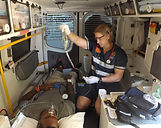HLT31220- Certificate III in Basic Health Care
The Certificate III in Basic Health Care will equip individuals with essential skills and knowledge to provide fundamental healthcare services in various settings. It covers key topics such as basic anatomy and physiology, infection control, medical terminology, communication skills, and basic patient care. Delivered through a hands-on approach, the program ensures students gain practical experience and are well-prepared to meet industry standards.
This program is ideal for those in existing healthcare roles seeking to formalise and update their skills. Existing workers undertaking this program typically hold positions in community care, disability support, or as assistants in nursing within hospitals, residential care facilities, or home care environments. It also applies to individuals who provide a first response in workplaces such as industrial sites, first aid organisations, and the Australian Defence Force (ADF).
Our team of experienced industry professionals offers extensive support and personalised guidance throughout the course, ensuring students succeed in their studies and excel in the healthcare sector. By enrolling in the Certificate III in Basic Health Care, students will acquire the necessary skills to improve patient outcomes and meet the demands of the healthcare industry. They will also have the opportunity to advance their studies in additional or higher qualifications, such as the Certificate III in Non-Emergency Patient Transport or the Certificate IV in Health Care.
Course duration:
Expected minimum duration (months): 6
Expected maximum duration (months) : 12
Mode of Delivery
Blended Online Delivery with Face to Face Practical Skills sessions and assessment
The following units of competency are included:
Core Units
-
HLTWHS006 - Manage personal stressors in the work environment
-
HLTOUT010 - Communicate in complex situations to support health care
-
HLTWHS002 - Follow safe work practices for direct client care
-
BSBMED301 - Interpret and apply medical terminology appropriately
-
HLTINF006 - Apply basic principles and practices of infection prevention and control
Elective Units
*Category 5 Emergency Care delivers nationally recognised training on behalf of Allens Training Pty Ltd RTO 90909
Entry Requirements
An individual undertaking this qualification will need to demonstrate the following to be eligible for entry:
-
Students must hold an open/ unrestricted Australian driver’s license
-
Satisfactorily complete a language, numeracy and literacy assessment prior to or on course commencement to assess capacity to meet the LLN requirements of this course
-
Physical capability to be able to meet the demands of the practical demonstration skills
-
Protective slip resistant footwear/safety shoes must be provided by the student and worn during the practical sessions and assessment
-
Unique Student Identifier USI
Students must have access to a computer, smart phone, tablet or other electronic device with access to the internet to complete the online studies and practical assessment.
Pre-requisites and Co-requisites
There are no pre-requisites of co-requisites for this qualification.
Course Outcomes & Pathways
After successful completion of the program students will be awarded a Nationally Recognised Qualification for HLT31220- Certificate III in Basic Health Care
Cost
$1999/person (Payment plans are available)
Frequently Asked Questions (FAQs) – HLT31220 Certificate III in Basic Health Care
1. What is the HLT31220 Certificate III in Basic Health Care?
The HLT31220 Certificate III in Basic Health Care is a nationally recognised qualification that prepares students to provide basic health care support in a range of health and community settings under the supervision of qualified health professionals.
2. Who is this course suitable for?
This qualification is ideal for individuals looking to start a career in the health industry, or for those already working in related areas (such as first aid, aged care, or community services) who want to broaden their skills and career opportunities.
3. What kind of jobs can I get with this qualification?
Graduates may find employment in roles such as:
-
Event Medic
-
Health Services Assistant
-
Hospital Orderly
-
Ward Assistant
-
Patient Support Assistant
-
Community Health Worker
-
Health Care Support Worker
4. What will I learn in this course?
You’ll learn essential skills to:
-
Advanced First Aid and Advanced Resuscitation Skills
-
Assist with basic clinical procedures
-
Communicate effectively in a health environment
-
Support clients with personal care
-
Comply with infection prevention and control procedures
-
Recognise healthy body systems
-
Work within health and safety guidelines
5. Are there any entry requirements?
There are no formal academic entry requirements. However, students must:
-
Be at least 16 years old (18 for some workplaces)
-
Have basic English literacy and numeracy skills
-
Be physically able to perform manual handling tasks
-
Hold a current National Police Check and Working with Children Check (if required by placement providers)
6. How long does the course take to complete?
Course duration typically ranges from 6 to 12 months, depending on the delivery mode (full-time, part-time, or blended learning) and the student’s previous experience or credit transfer.
7. What are the study options?
The course is delivered using a range of training strategies:
-
Face-to-face in classroom and simulated environments
-
Blended learning, combining online study with practical workshops
-
Workplace-based training, for those already employed in a health-related role
8. Is there a practical placement component?
Yes. Students are required to complete work placement hours (typically around 80–120 hours) in an approved health care setting to demonstrate practical competency.
9. What kind of assessments are involved?
Assessment methods may include:
-
Written knowledge assessments
-
Practical demonstrations in simulated environments
-
Workplace observation
-
Case studies and role plays
-
Third-party reports from supervisors
10. Do I need to organise my own placement?
In most cases, Category 5 Emergency Care will assist in arranging suitable placement opportunities. However, students who already work in an appropriate health care setting may be able to use their workplace for placement hours.
11. Can I get recognition for prior learning (RPL)?
Yes. If you have previous experience or training in health care, you may be eligible for Recognition of Prior Learning (RPL) or Credit Transfer (CT). Documentation and evidence will be required to assess your eligibility.
12. What qualification will I receive after completing the course?
Upon successful completion, you will be awarded the HLT31220 Certificate III in Basic Health Care, a nationally recognised qualification under the Australian Qualifications Framework (AQF).
13. What can I study after this qualification?
Graduates may continue their studies with:
-
HLT41120 Certificate IV in Health Care (Ambulance)
-
HLT43015 Certificate IV in Allied Health Assistance
-
Diploma-level qualifications in health, community, or emergency care pathways
-
It can also be used as a pathway towards university
14. How much does the course cost?
Fees vary depending on the training provider, delivery mode, and funding eligibility. Some students may be able to access government subsidies or payment plans. Contact your training provider for detailed fee information.
15. What support is available during the course?
Students have access to:
-
Qualified trainers with industry experience
-
Academic and learning support
-
Placement coordination assistance
-
Online learning resources and student support services








.png)
